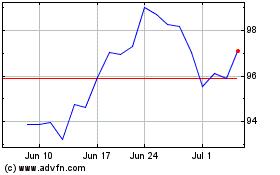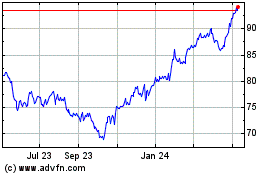Global growth in the consumer industry has slowed and talk of
recovery in the U.S. and Western Europe is premature, Reckitt
Benckiser PLC (RB.LN ) Chief Executive Bart Becht told Dow Jones
Newswires.
In a recent interview at the company's headquarters in Slough,
England, Becht, who shocked the markets last month when he
announced his retirement from the FTSE 100 group from this
September after 16 years at the helm, also said the household and
healthcare giant is ready to look at any transformational deal
opportunity alongside its ambitions to grow market share across its
brands portfolio, even as it continues to offset escalating input
pressures by paring costs.
Last month, the U.K.-based maker of Dettol disinfectant,
cleaning product Cillit Bang and Air Wick air fresheners, posted a
rise in first-quarter profit on higher sales, boosted by surging
demand for household and personal care items in emerging
economies.
Sales in Asia, Africa, Latin America, the Middle East and
Eastern Europe, where rising incomes and socio-economic improvement
have driven higher demand for its products, more than offset
weakness in Western Europe and North America. Still, like its
rivals, the company faces a challenging outlook in mature markets
where, in addition to cut-throat promotional competition from
suppliers and retailers, the disposable spending power of
cash-strapped shoppers is being hit by rising unemployment and
squeezed by government-backed austerity tax hikes and public
spending cuts.
Becht warned structural macro-economic weakness in major Western
economies has tapered the rate of growth, even as the globalized
industry gradually shifts to the East. "The overall global growth
clearly has come down somewhat because Western Europe and North
America are still a huge part of that picture," he said.
"In Europe, the situation continues to be very, very weak. In
North America, it also continues to be rather weak. It is
marginally better than it was maybe a couple of months ago, but it
is not good enough in order to call it that we have a recovery. It
is way too early for that."
Dutch national Becht, speaking at a breakfast bar in a dummy
'supermarket' showcasing the group's branded products, rejected
speculation that his surprise departure was the result of a split
at board level over the strategic direction of the company,
including involvement in a play for a transformational merger or
acquisition, such as with Unilever (ULVR.LN), Procter and Gamble
Co. (PG) or Colgate-Palmolive (CL). "That is complete rubbish.
There was one analyst who dreamt up this hypothesis. It is complete
nonsense."
Still, he added there is capacity for a major deal in the
industry and the group is ready to scrutinize such an opportunity.
"Transformational deals basically happen once every couple of
decades. When the opportunity, if ever, arises, I am sure we will
take a look at that. Yes, there is room for it. It might happen,
[but] I don't think it is very likely to happen."
The group delivered GBP11 million first-quarter cost synergies
from its GBP2.5 billion buy of SSL International PLC in 2010, which
owns the Durex and Scholl brands. It has recently focused on
bolt-on acquisitions in emerging markets to build portfolio and
brand equity. Last December, it acquired India-based Paras
Pharmaceuticals for GBP460 million.
The company, which also makes Lysol disinfectants, Clearasil
spot cream and Finish dishwasher powder, as well as French's Yellow
Mustard, is also being hit by rising commodity prices as the cost
of oil, palm oil, chemicals and plastics soars. To combat these
effects, it is ramping up savings by streamlining packaging and
paring logistics, sourcing and purchasing costs to stem profit
margin losses.
The CEO said long-contract hedging mitigates against daily price
movements. "We don't buy necessarily on a spot basis. We lock
prices in on raw and packaging materials, anywhere from three to 12
months, to make sure we have some stability in our cost
structure."
A week ago, global commodities prices including gold, silver and
oil crashed on fears of a global economic slowdown, resulting in
some of the biggest falls in a two-year period characterized by
upward pressure. Becht said it was a correction that should be
positively received. "The fact they are coming down is welcome news
because a lot of it has been very speculative."
In a bid to recover higher costs, the company invests in
innovation and product design, like replacing butane in aerosol
cans with compressed air, improving the ergonomic utility of toilet
fresheners and packing dishwasher tablets in cardboard packaging
rather than plastic. Becht said the real work begins once the new
product hits the shelves. "You always have to start your cost
optimization after you have launched. There is always stuff to be
done."
Still, Becht said shrinking the quantity of a household product
is a no-go area, unlike for food manufacturers. "[You can] take out
packaging materials, but not change the experience for the
consumer. Taking quantities away is taking away from the consumer."
Earlier this year, reports said U.S.-based Kraft Foods (KFT) cut
the size of its Cadbury Dairy Milk chocolate bar due to the rising
cost of ingredients.
In addition, while the group drives through selective price
increases in developing markets, Becht said it is a different story
for mature economies where highly-competitive supermarkets rely on
their value proposition to drive sales.
"We have not really taken price increases of any substance in
Europe or North America. I don't believe at this stage of the game
there is substantial room for material price increases because of
where the consumer sits today. I don't think [the promotional
environment] will change overnight."
Becht said there are further growth gains to be made for its
'powerbrands', including Calgon limescale tabs and Vanish stain
remover. "In 2000, right after the merger, we had less than 40% [of
our business] in our powerbrands and today we have close to 70%.
They are strong market leaders in categories which still have
substantial growth potential because they tend to be
under-penetrated, not just in developing markets but also in
developed markets."
"Automatic dishwashing is a classic example. Dishwashing machine
penetration, even in Western Europe and North America is somewhere
between 30% and 60%, when you have washing machine penetration at
90% plus. We drive [this] penetration together with [appliance
manufacturers] like Bosch Siemens and Whirlpool".
However, first-quarter group fabric care sales fell 6%, hit by
laundry detergent purchases in the struggling economies of
Portugal, Greece, Spain and Italy, while Europe overall was
relatively flat in dishwashing. Becht said the trend wouldn't
change in the short term.
"For dish, the overall market growth rate has come down
somewhat, [but] it is not a share issue. Fabric is a very different
story because our softeners are mostly driven by laundry detergents
in southern Europe. Volume is not fantastic and promotional spend
is very high. I don't see that changing in the next couple of
months." He said next year "we will see some better results."
Meanwhile, Reckitt Benckiser's pharmaceutical business is
delivering strong returns. Last month, it noted "very good"
progress on patent-protected Suboxone film -- a heroin dependency
treatment that dissolves under the tongue -- which had 37% volume
share in the U.S. by the end of 2010. New pipeline initiatives for
the drug will be revealed in the next 12 months. Suboxone tablets
were exposed to potential generic competition after its exclusivity
in the U.S. expired in October last year, but the company's move to
the patented film products should help protect it from
competitors.
Despite Suboxone's success, and apart from "one or two" possible
extensions into addiction treatments, Becht said the group has no
plans to greatly expand its pharmaceutical operations. "We are a
niche pharmaceutical company," with no intention to become a major
one, he said.
On his future and after taking a break, Becht, 54, said he
remains open to an external non-executive position once his tenure
ends, though he hasn't found one yet. "So far, I have not really
had the time".
However, he aims to shift direction. "I am mostly focused on
smaller businesses, not so much in an executive capacity. There
will be some private companies probably that I want to be involved
with," he said.
However, his extensive charity work will also take center stage,
which includes support for organizations including Save the
Children and Médecins Sans Frontières. "One of the reasons why I am
retiring is also to make sure we can spend some of the money on the
right causes. But that takes much more time that I ever
envisioned." In 2009, Becht transferred around GBP110 million in
stock options to his trust.
The announcement of his planned departure came less than five
months after Liz Doherty replaced Colin Day as chief financial
officer. Yet Becht, who will be replaced by executive
vice-president of global category development Rakesh Kapoor, said
concerns about the speed of management change at the company were
overdone.
"Colin's departure had nothing to do with my retirement. They
are completely unlinked events. It is a bit like praising or
killing the messenger. Since we have been bringing the good news
basically for the last 10 years, they think the news is directly
linked only to us. This is a team effort of nine people at the end
of the day".
Under Becht's leadership, the company's shares have soared more
than fivefold, from 600 pence in 1999 to more than 3000 pence
today.
"I have done this for 16 years, which is a long time. And I
think there comes a time when the company, as well as myself, are
ready for a change. There is never a perfect time, but it is about
as good a time as there can be for this transition to be made".
By Simon Zekaria, Dow Jones Newswires; +44 207 842-9410;
simon.zekaria@dowjones.com
Colgate Palmolive (NYSE:CL)
Historical Stock Chart
From Oct 2024 to Nov 2024

Colgate Palmolive (NYSE:CL)
Historical Stock Chart
From Nov 2023 to Nov 2024
